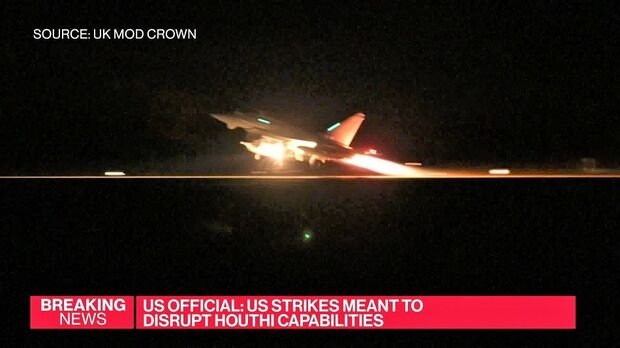US and UK Launch Targeted Strikes on Houthi Sites in the Red Sea
US and UK Launch Targeted Strikes on Houthi Sites in Yemen Amid Escalating Red Sea Attacks

US, UK Strike Houthi Sites in Yemen Amid Surge in Red Sea Attacks
In a decisive move, the US and UK military forces launched targeted airstrikes against Houthi rebel sites in Yemen, marking a significant escalation in response to the Iran-backed group's increased maritime aggression in the Red Sea and the Gulf of Aden. This strategic military action aimed at crippling the rebels' capability to launch further attacks on commercial and naval vessels, a threat that has put a strain on global shipping routes and heightened tensions in the region.
The Strategic Importance of the Red Sea and Gulf of Aden
The Red Sea and the Gulf of Aden stand as critical corridors for international trade, funneling thousands of ships annually between the Indian Ocean and the Mediterranean Sea through the Suez Canal. The surge in Houthi attacks not only threatens this vital shipping lane but also poses significant economic and environmental risks. Ensuring the security of these waters is paramount for maintaining global trade stability and supporting Middle Eastern economies reliant on maritime logistics.
Timeline of Recent Houthi Attacks
The Houthi rebels have intensified their maritime assaults since November, targeting over 30 commercial and naval vessels in a purported protest against Israel's actions in Gaza. These attacks have ranged from drone strikes to direct assaults on ships, culminating in significant damage and raising alarms over the safety of maritime operations in the region.
Details of US and UK Military Response
The coordinated airstrikes by US and UK forces targeted 18 Houthi sites, including underground and missile storage facilities, drone operations, and air defense systems. This operation, detailed by the US Defense Department and echoed by UK Defense Secretary Grant Shapps, was designed to degrade the rebels' offensive capabilities, signaling a robust stance against the Houthi's continued aggression.
The Role of Iran in the Houthi Rebellion
Iran's support for the Houthi rebels is a central element of the conflict, with Tehran accused of supplying the group with weapons and technology to carry out their maritime attacks. This backing has drawn international condemnation and positioned the conflict within the broader context of Iranian influence in the Middle East.
Impact on Commercial Shipping
The Houthi assaults have not only endangered crew members but have also disrupted key shipping routes, leading to calls for increased naval security measures and international cooperation to safeguard maritime commerce. The damage to vessels, some of which risk sinking, underscores the critical need for a concerted effort to protect this global trade artery.
Humanitarian Concerns in Yemen
Beyond the military and economic implications, the airstrikes and ongoing conflict in Yemen have profound humanitarian consequences. Yemen, already ravaged by years of war, faces an exacerbated crisis, with millions in need of aid and protection from the fallout of continued hostilities.
Global Reactions to the Strikes
The international community has reacted with a mixture of support for efforts to secure maritime routes and concern over the potential for escalation. Diplomatic channels remain active in seeking a resolution to the conflict, with a focus on mitigating the humanitarian impact on Yemen's civilian population.
Future of Naval Security in the Red Sea
As the US and UK take a stand against Houthi aggression, the future of naval security in the region hangs in balance. Enhanced surveillance, increased naval patrols, and international collaboration are key to deterring further attacks and ensuring the safety of commercial shipping in these strategic waters.
Conclusion
The US and UK's military intervention in Yemen represents a critical juncture in the ongoing struggle to maintain security in the Red Sea and Gulf of Aden. While the immediate goal is to neutralize the threat posed by Houthi rebels, the broader objectives include stabilizing the region, protecting international trade routes, and addressing the humanitarian crisis in Yemen. The path forward requires a delicate balance of military readiness, diplomatic engagement, and a commitment to peace and security in the Middle East.
FAQs
- What prompted the US and UK to strike Houthi sites in Yemen?
- How do Houthi attacks affect global shipping?
- What role does Iran play in supporting the Houthi rebels?
- What measures are being taken to protect commercial vessels in the Red Sea?
- How does the conflict in Yemen affect its civilian population?
- What are the prospects for resolving the conflict in Yemen?
Summary:
In a decisive response to the increasing threat in the Red Sea, the US and UK have conducted targeted airstrikes on Houthi militant sites in Yemen. This action comes after a series of attacks by the Iran-backed group on commercial and naval vessels, highlighting the international effort to curb the Houthis' aggressive maneuvers and ensure maritime security.
"Following a surge in Houthi attacks on ships in the Red Sea, the US and UK have hit 18 Houthi targets in Yemen, aiming to degrade the militants' capabilities and safeguard international shipping lanes. Discover the impact of these strikes on regional stability."
What's Your Reaction?






















